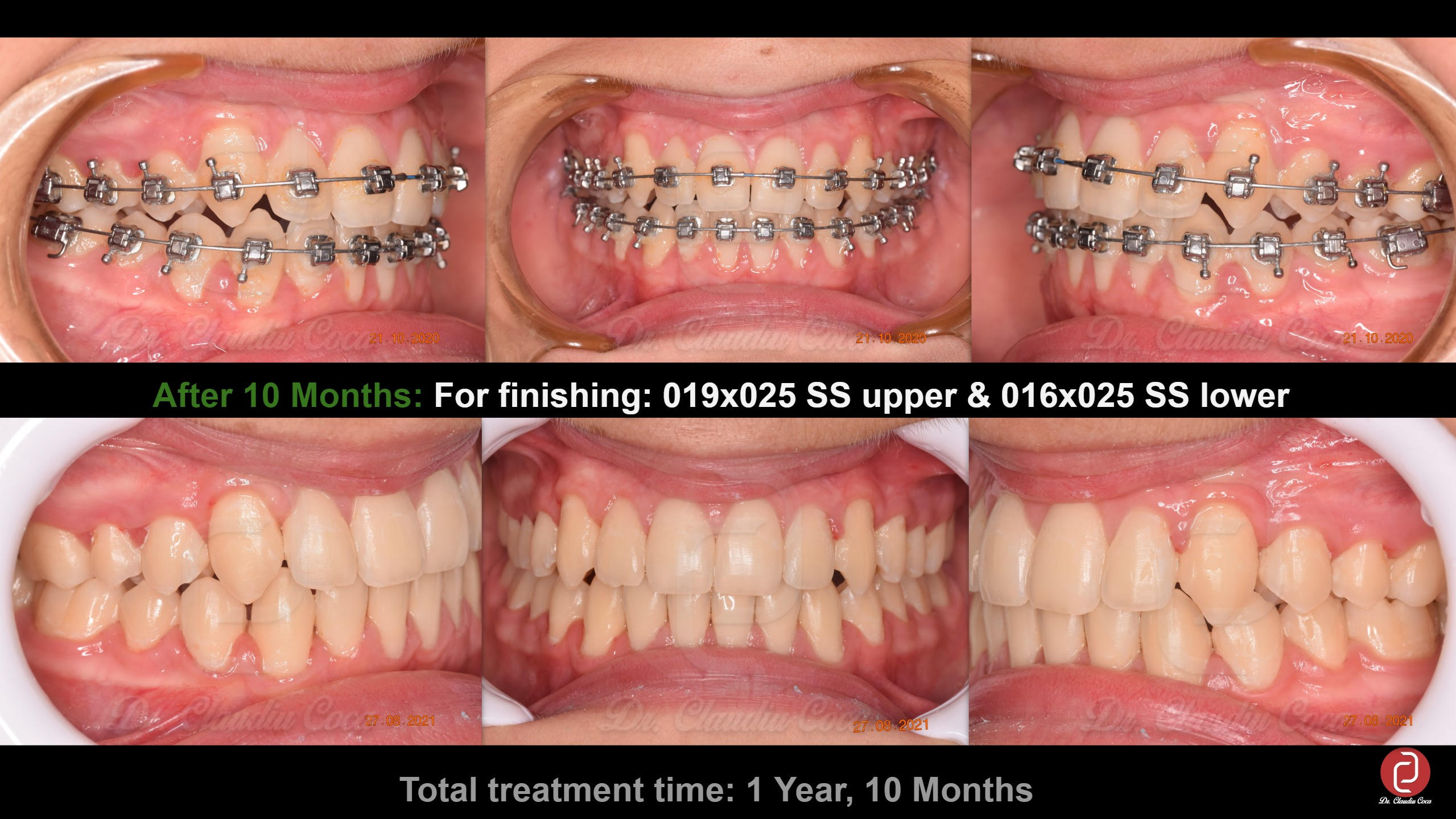
Using simple biomechanics, the upper cuspids, lacking space, are treated considering the face first
#1 Appointment Case Details
A 13 years old boy presents with an esthetic problem. Parents and the young man are looking to avoid extraction treatment if possible.
Diagnostics:
- Class I Dental
- Major crowding with almost complete lack of space for 13 and only about half the space available for 23.
- Midface deficiency with lacking support for the upper lip
Face Treatment Plan
- Improve midface support
- Improve lip support in the lateral thirds
- Improve lip step
- Maintain upper incisor inclination
Intraoral Treatment Plan
- Rezolve crowding
- Fix the class II
- Develop upper arch
- Fix the midline discrepancy
Observations
- Do not “open” the face
- Many apexes are widely open
- High forces can lead to root resorption
General Treatment Plan
- No Extractions
- No Stripping
- No RPE
- No TADS
- No Corticotomy
- No Flaring
- No Inclination of the lateral groups
- Damon Q2 Bracket
- Light Forces
- Bone Reshaping
#2 Appointment: Bonding Day
Treatment Protocol
- Torque Selection
- 12-22 Low Torque / Retrocline
- 13,23 High Torque / Procline
- 33-43 Normal Torque
- Today I would choose:
- 32-42 Low Torque / Retrocline
- 33,43 High Torque / Procline - Light Elastics
- Today
- I would start with Quail on the right side as well
- I would start with 14-47 and not touch the cuspid until there is more space -> Month 4 in this case. - Coil Spring
- Today I would activate only 1-2 spirals every 6 weeks - Bite Turbos on lower 6s
#3 Appointment
- Better choice for the right side elastic
#4 Appointment
- 13 is engaged with the 013 CuNiTi wire
#5 Appointment
- 8 months due to pandemics that should have been 3 or 4 the most
- 014x025 CuNiTi wire is in. This is also known as the bionator wire.
- Bite Turbos Removed
- Otter (3/16’’ 3oz) elastics only at night
#6 Appointment
- After 2 months
- 018x025 CuNiTi wire in the upper arch to allow for an easy insertion of the 019x025 SS
#7 Appointment
- 019x025 SS wire in the upper and 016x025 SS wire in the lower for finishing
- Stainless Steel wires were adapted to the shape of the lower arch
#8 Appointment
- Finishing bends

#9 Appointment
- Removal of braces
Total treatment time: 1 Year, 10 Months
- On total duration please consider:
- About 3-4 months were lost due to pandemics.
- My personal primary retention protocol implies keeping the patient with the final archwires for 3 months before debonding.
That would mean about 16 Months of actual treatment!
Observations
- Very nice Class I
- Healthy gum aspect throughout the treatment
- Midline centred
- To monitor
- Space between 43 and 44
- Occlusion settling
Observations
- Apexes have closed nicely
- No root resorptions
Observations
- Very nice transversal development of the upper arch
- I would argue that there is less vestibulo-inclination at the end than at the start - Reduced Wilson curve on the lower arch
Observations
- Better midface support
- Better upper lip expression in the lateral thirds
- Better lip volume overall
- including considering growth
Observations
- Better facial esthetics!
- Improved Lip proportion & exposure
- Improved Lip step
- Improved Mentolabial crease
This face will age better!
Observations
- Space between 43-44 has closed
- Occlusion is better but still needs to settle some more
Setup used
- Damon Q2 bracket 5-5
- Snaplink all 6s
- Titanium all 7s
- Archwires
- CuNiTi: 013 x2; 014x025 x2; 018x025 x1
- SS: 016x025 x1; 019x025 x1 - Elastics Quail [3/16’’ 2oz] and Otter [3/16’’ 3oz]
- NiTi Open Coil Spring Medium
- BlueGlue for Bite Turbos
- GreenGlue for bonding
Conclusions
- Arch development can be very simple and extremely effective with the right tool and the right protocols. - Our treatment choices affect our patients throughout their life and if we could choose to be less invasive maybe we should consider it.